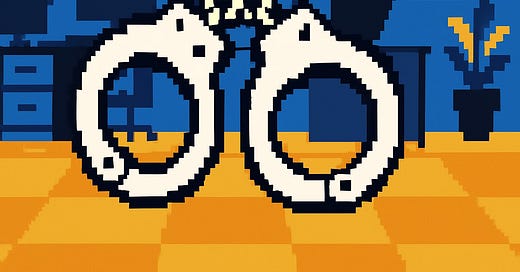Welcome to work life in 2025: a place where "being yourself" is mandatory, but only the company-approved version of yourself.
Career advice these days is simple: Be unique. Be authentic. Be passionate. But also, please fit perfectly into the team, respect all kpis, and never, ever suggest a change to the monday meeting format. German sociologist Andreas Reckwitz calls this phenomenon "The society of singularities." translation: everyone must now be one-of-a-kind, as long as it fits on a powerpoint slide.
In late modern work culture, the old iron chains of factory life have been replaced by something far more stylish Reckwitz calls ‘Pearl chains’ Iron chains were brutal but honest; you knew you were trapped in machine. Pearl chains, on the other hand, shimmer with the promise of opportunity. You clasp them on yourself willingly, convinced you’re accessorizing yourself for success, while in reality you’re just as stuck as with the iron ones. The expectation to be unique, to live your passion, to constantly self-optimize isn’t just pressure; It’s a designer brand of pressure. You don’t feel oppressed; you feel special. Stressed, but special.
And that, as Reckwitz points out with the calm of someone watching, hands folded on the table, a very slow car crash, is exactly what makes it so effective. You think you’re free because the handcuffs are prettier.
I read this in Sleek Magazine while in a coffeebar in Berlin near Rosa Luxemburgplatz and it struck a chord with me while I was watching two students two tables next to me, working on their MacBook with cat stickers.
Universities and other educational institutions have taken note. Career centers offer workshops titled things like “branding your authenticity” and “finding your inner unicorn.” meanwhile, employers post job ads demanding "bold, creative visionaries"... to update excel sheets and align on stakeholder synergies.
The result? A whole generation believing that if their job isn't a spiritual extension of their deepest self, they have somehow failed. Also: side hustle or you basically don't exist.
After years of being told they are "The leaders of tomorrow," early-career professionals enter the workplace. where they quickly discover their most valuable skill is not causing problems. “Be disruptive!” recruiters said. “please just update the crm like everyone else,” their manager now says.
The average day at the innovative, purpose-driven startup involves filling out compliance forms, writing reports no one reads, and pretending to be excited about the new slack channel for "innovation synergy tips." Yes, there’s a foosball table. no, you may not leave before 7 pm. Uniqueness is great , preferably in the form of ironic socks during the team photo. Otherwise? Kindly color inside the lines.
Applying for a job today is like trying out for a part in a bad high school musical, Except the stakes are your rent.
Step one: Pretend your childhood dream was to optimize operational workflows.
Step two: Declare undying passion for “innovative solutions in the b2b saas space”.
Step three: Cry inside.
The lucky ones who land an internship must then perform loving every task with broadway-level enthusiasm. Need to make 500 photocopies? "what an amazing learning opportunity!" Need to book travel for seven executives? "I’ve always been passionate about logistics!" all while posting on linkedin about how #grateful they are to be "growing their leadership capabilities." Translation: Fetching oat milk lattes while smiling like a Disney cast member with a developing drinking habit.
Sidenote: Just stop with the #thankfull’ BS on linkedin. That’s the handcuffs in full effect.
Shockingly, being constantly "on" while pretending to be a walking ted talk eventually leads to burnout. By age 26, many early-career workers are so tired they could list "existential fatigue" as a core competency. The Dutch discovered this earlier: already in 2018, over 20% of young workers in the Netherlands reported burnout symptoms. and those were the good years.
It turns out that being told "your job must be your life's purpose" creates a tiny bit of pressure (just a tiny, promise). Especially when your actual daily task is renaming files correctly in sharepoint. Fun fact: studies show young professionals mentally "check out" for about 60 workdays a year. No wonder; it’s hard to stay "passionate" about updating stakeholder matrices while surviving on aldi hummus form the sales isle.
Are we freer? Hard to say. But we are definitely busier pretending we are.
So dear HR, maybe the solution isn’t another ‘Gen Z in the workplace’ keynote with PURPOSE on a slide in font BRUTALISM sized 300 or a new mural about "authenticity" in the break room. Maybe it’s simply admitting that pearl chains are still chains. that no matter how many buzzwords or branded hoodies you hand out, you’re still asking people to look fabulous while staying firmly in line. Real freed at work starts with letting people be ordinary sometimes. Pearls or not, if you can't take them off, they’re not jewelry.
They’re handcuffs. With cat stickers.




